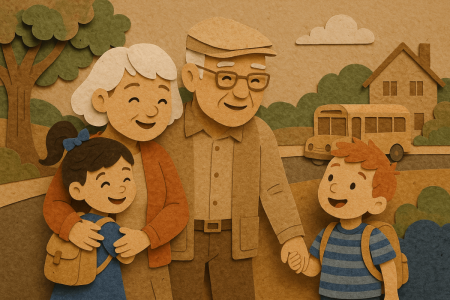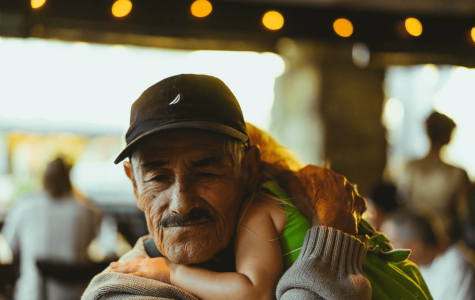From Playdates to Pickups: Why Aussie Grandparents Are the New Childcare Backbone
- Replies 18
Do you remember when being a grandparent mostly meant fun visits, spoiling the little ones on special occasions, and then handing them back to their parents? Many older Australians fondly recall those days.
Times have changed. Today’s grandparents are increasingly trading occasional playdates for regular school pickups and babysitting shifts. In modern Australia, Nan and Pop have become an essential part of the childcare equation.
Research has found that about one in three Australian grandparents now provide regular care for their grandchildren – a rate much higher than in many other countries. They are the “support village” working parents lean on, filling gaps when daycare is unavailable or unaffordable. This growing role brings plenty of joy and bonding, but also a fair share of challenges.
In this editorial, we explore the benefits and burdens of Australia’s grandparent carers, and what their rise means for families and society.
Why Grandparents Are Stepping Up More Than Ever
Several social and economic forces are driving the increased reliance on grandparents for childcare. Firstly, childcare has become expensive and hard to secure. Australia has some of the highest childcare costs in the developed world. An average family with two young children spends around 16% of its total household budget on childcare, compared to about 9% in other OECD countries. In some cities, long daycare waitlists and fees climbing faster than wages make formal childcare a luxury for many families.For example, in Victoria the average cost of 50 hours of centre-based care is about $626 a week – a daunting sum for ordinary working parents. With a cost-of-living crunch and rising interest rates squeezing budgets, it’s no surprise that many families are turning to grandma and grandpa for help.
Another factor is the increase in dual-income and single-parent households. As more parents (especially mothers) return to work or work longer hours, someone needs to mind the kids. Grandparents often become the default solution. This is especially true for single parents who may have limited options – single mums in particular lean on their own parents for support when formal care is unaffordable or unavailable.
In many families, grandparents offer flexible, trusted care that daycare centers can’t: they can step in on short notice when a child is sick, or cover the “gap” hours before and after school. One study of over 4,000 Australian grandparents described them as both “mother savers” and “system savers,” picking up the slack where formal childcare systems fall short. In other words, without grandparents, many parents (and especially mothers) would struggle to stay in the workforce.
Lyn Craig, a sociology professor and co-author of that 2024 study, notes that Australia’s lack of affordable childcare has effectively led two generations of women – mothers and grandmothers – to “stitch together” family-based care arrangements to get through the week.
Cultural expectations have also evolved. Decades ago, once their own kids were grown, many Australians expected to enjoy a relaxed retirement. Today, retirement often includes childcare duties. In fact, nearly 27% of Australian grandparents regularly care for their grandkids under 12, according to National Seniors Australia research. Grandparents step up for various reasons: to support their children’s careers, to build close relationships with the grandchildren, or simply to stay useful and active in later life.
Sometimes, it’s out of necessity – if formal childcare is too costly or if parents work irregular hours, grandparents may feel it’s their responsibility to help. Other times it’s out of opportunity – they genuinely want to be involved and enjoy the time with the little ones. The COVID-19 pandemic further highlighted this reliance: when lockdowns separated families, many realised just how much quiet labor grandparents were contributing, from school pickups to daily supervision.
It’s worth noting that geography can influence these arrangements. In big cities and suburbs, grandparents might drive across town in rush-hour traffic to babysit, juggling schedules around daycare days.
In regional and rural areas, formal childcare services can be scarce – nearly half of Australians live in so-called “childcare deserts” with limited access to childcare centers. In those communities, family networks often become the only reliable safety net. Whether in the bush or the ‘burbs, the outcome is similar: grandparents have become the backbone of informal childcare in Australia.
The Joys and Benefits of Being a Grandparent Carer
Despite the extra work, many grandparents genuinely cherish their role as part-time carers. It’s not all duty – there are heartfelt rewards that come with looking after the grandkids. Intergenerational bonding is perhaps the greatest joy. Grandparents often describe the time with their grandchildren as precious and fulfilling. “It is the best feeling to care for your grandchildren, love them to bits,” one grandparent told researchers, and others echoed that sentiment.Being involved in day-to-day moments – from playdates in the park to bedtime stories – can strengthen the emotional bond across generations. Many older Australians find renewed purpose and happiness in these interactions. One doting grandfather proudly called caring for his two granddaughters and two grandsons “the best part of my twilight years”. Such warm relationships can benefit the children as well: a study of over 1,500 children in the UK found that those with high grandparental involvement had fewer emotional and behavioral problems, suggesting grandparents can positively influence their grandkids’ wellbeing (Goodfellow, 2012).
Grandparents provide unconditional love and a sense of stability that kids thrive on, not to mention a link to family history and culture through stories and traditions.
Beyond the emotional rewards, there are practical benefits to this arrangement for all generations. Grandparent care can be more one-on-one and nurturing compared to busy daycare centers. Many grandparents delight in teaching life skills – whether it’s baking Anzac biscuits, gardening, or speaking words from their mother tongue – thus passing down wisdom and family heritage. Children often soak up these lessons and remember them for life. Meanwhile, parents gain peace of mind knowing their little ones are in loving hands. The family saves money on childcare fees, easing financial pressure on the middle generation.
By one estimate, unpaid grandparent care was saving Australian families and the economy about $127 million each week in formal childcare costs. (That figure is based on 2015 data – the dollar value would be even higher today with rising childcare prices.) Grandparents’ contribution, often invisible in GDP statistics, is in the billions per year. This economic value underscores how crucial their role has become in society’s functioning.
Interestingly, being an involved grandparent can also have health perks for the seniors themselves, as long as the caregiving doesn’t become too intense. Research suggests that staying active with grandchildren can improve older adults’ mental sharpness and overall health. For example, an Australian study cited in the Sydney Morning Herald found that grandmothers who babysat one day a week scored better on memory and cognitive tests, potentially lowering their risk of dementia (McKenzie, 2014). The social interaction, physical activity (like chasing after a toddler!), and mental engagement that come from looking after kids may keep grandparents feeling young and connected.
As one health expert noted, playing with grandchildren can get seniors moving and laughing – great medicine at any age (Nicholson, 2018). Knowing they are needed can also boost a retiree’s sense of self-worth and combat loneliness. It’s a classic win-win: grandkids get loving care, and grandparents stay youthful in spirit.
Of course, moderation is key. The happiest scenarios seem to be those where grandparents help out regularly but manage to maintain balance and personal time. In family surveys, many older Australians say they want to be part of their grandkids’ lives – just not overwhelmed by the responsibility. When the arrangement is mutually agreed and fits everyone’s needs, grandparent caregiving can truly be a joy.
As National Seniors Australia put it, grandparenting is “a skilful, intellectual, and economic gift” that older generations give to the next. It exemplifies the best of the Aussie “village” approach to raising children – a coming together of family for the benefit of all.
The Hidden Costs and Challenges Facing Grandparent Carers
On the flip side, serving as the family’s go-to babysitter isn’t always smooth sailing. Along with the hugs and happiness, grandparents often face physical, emotional, and financial challenges in their caregiving role. One common refrain is that looking after young children can be exhausting. There’s a reason parenting is typically a job for the young – keeping up with a rambunctious toddler or carrying a baby for hours can tax even the fittest 60-something. Energy levels and health issues are a real consideration.Long days of childcare can leave older carers aching or fatigued, especially if they have health conditions of their own. As one candid grandmother wrote, she and her husband had already spent decades raising their own kids and did “not wish to take on that level of responsibility again” in their retirement. She described full-time childminding as “abject drudgery” and firmly set boundaries with her family. Her stance sparked a national conversation because it resonated with many seniors who felt burnt out or taken for granted by increasing childcare expectations.
Feelings of obligation and guilt can weigh heavily on grandparents. Some report a sense of duty so strong that they sacrifice their own needs. In National Seniors’ research, a number of grandparents admitted they felt they had “no choice” but to fulfill their adult children’s requests for childcare – even at their own “financial and emotional expense”. It’s a delicate dynamic: grandparents want to help and may not want to disappoint their kids or see their grandkids in daycare full-time, yet they may also yearn for a more relaxed retirement than essentially becoming second-time parents.
This can lead to quiet resentment. In fact, a survey by Australian Seniors Insurance Agency revealed 23% of grandparents wished to look after their grandchildren less than they currently were. Over half (58%) said they had to sacrifice their own lifestyle and recreation time to care for grandkids, and nearly a third had even altered their work arrangements (e.g. cutting back hours or delaying retirement) to accommodate childcare duties. These are significant life changes that can breed frustration if not openly acknowledged within the family.
Generational tensions and differing parenting styles can be another challenge. Not every aspect of modern child-rearing comes naturally to the older generation – whether it’s wrangling car seats, deciphering food allergy rules, or keeping up with screen time guidelines. Well-meaning grandparents can feel hurt if their methods are critiqued by the parents. “I’ve seen grandmothers become resentful when parents criticize them for not doing things the ‘right way’,” wrote Ms. Moore, the aforementioned grandmother who set boundaries.
Navigating these disagreements requires tact on both sides. Grandparents might bristle at being told how to care for a child (after all, they raised the parents!), while moms and dads might worry about outdated practices. It’s easy for small issues – like how much sugar is okay, or discipline approaches – to become sources of conflict. Clear communication and respect are critical to preventing resentment. Childcare experts advise families to discuss expectations and boundaries early, so everyone is on the same page about schedules, discipline, and responsibilities. When grandparents feel more like unpaid servants than appreciated helpers, it strains the relationship.
As one senior lamented, many older carers feel “unrecognised” for the huge economic value of what they provide. Feeling taken for granted by both society and one’s own family can lead to bitterness.
Then there are the financial impacts on grandparents. Retirees on fixed incomes don’t get paid for babysitting, and though most wouldn’t charge their kids, the costs can add up. Driving the kids around means paying for fuel; having the grandkids over frequently can bump up grocery and electricity bills.
Some grandparents also contribute materially – buying kids clothes, toys, or helping with school expenses – out of love, but these expenses can strain a modest budget. More significantly, when grandparents devote many hours to childcare, it can limit their ability to earn income or pursue other activities. A granddad in his early 60s might postpone a part-time job or turn down social engagements because he’s regularly watching the little ones. For those not yet fully retired, juggling work and grandparenting can be stressful. And for those who are retired, time spent caregiving might be time not spent on their own health, hobbies, or social life.
There can be an emotional cost too: some grandparents feel isolated from friends or peers because they can’t travel or participate in leisure activities as freely as they’d imagined in retirement. In the worst cases, when grandparents are providing 30 or more hours of care a week (essentially a full-time job), studies show over 20% of them experience clinical depression symptoms. Burnout is a real risk if the load isn’t shared or if grandparents don’t feel able to say “no” when they need a break.
Another emerging concern is the health and safety aspect – not just for grandparents, but for the kids. A provocative research finding recently suggested that grandparents might inadvertently contribute to childhood obesity. How so? Researchers theorize that some grandparents spoil their grandkids with sugary treats or big portion sizes (out of love, of course), or model more sedentary lifestyles, which can influence the children’s habits.
If Nan enjoys baking cakes every week or Pop isn’t as mobile, the grandkids might be less active or consume more treats in their care. This doesn’t mean grandparents are “to blame” for obesity – far from it – but it’s a reminder of the complex ripple effects of intergenerational care. It has even led to calls to include grandparents in public health strategies, for example offering guidance on healthy feeding and play for those regularly looking after young children.
Health considerations aside, many older carers simply worry about keeping up: “Will I have the stamina to chase after my toddler grandson?” “What if I get sick – who will help my daughter then?” These anxieties often weigh on the minds of conscientious grandparent carers.
Finally, it’s important to acknowledge the gendered nature of these caregiving roles. While many Australian grandfathers are wonderfully involved, grandmothers on average still do the lion’s share of hands-on care. Professor Lyn Craig’s study found that if a grandfather is not partnered (i.e. no grandmother in the picture), his involvement in grandchild care drops off significantly. It appears that in most families, the grandmother is the default babysitter, reflecting traditional gender roles that persist into later life.
Grandfathers tend to help as part of a couple, but rarely become solo carers in the same way grandmothers do. This means the rising reliance on grandparents has particular implications for older women’s time and well-being. Many women in their 60s and 70s find themselves still caregiving, after having spent younger decades raising children and perhaps caring for elderly parents. Some have dubbed this the “triple burden” on midlife and older women – careers, then childrearing, and then grandchild-rearing or elder care. It’s a cycle that can leave little room for these women to rest.
Societally, this raises questions about fairness and expectations: are we as a community placing too much on the shoulders of grandmothers? “Two generations of women were stitching together care arrangements to cover the gaps,” Craig observes, highlighting how working mums and their mums are absorbing the pressures of an inadequate childcare system.
The emotional reward may be great, but so is the pressure to be endlessly selfless.
Bridging the Gap and Building Bonds – Urban, Rural, and In Between
From busy cities to remote towns, grandparent carers have become the glue holding many families together. In urban areas, grandparents often act as “gap fillers” between other childcare arrangements. For instance, a family might use daycare three days a week and rely on Grandpa on the other two days. Or Grandma might do the school pickups and afternoon care until the parents get home from work. These arrangements require coordination and often negotiation – maybe Nan insists on no duties past 6pm, or Granddad can only help on certain days due to his own part-time job or volunteer work.Urban grandparents sometimes talk about mastering public transport or traffic jams with car seats in tow, all to be there for soccer practice or swim lessons. It can be hectic, but many say it keeps them engaged with the fast pace of their grandchildren’s lives. And for grandkids growing up in the city, having a grandparent around can be a grounding influence – a calm presence in contrast to their over-scheduled days.
In regional and rural Australia, the grandparent role can be even more vital due to fewer services. Small towns might have limited daycare slots or none at all for babies under 2, for example. When formal care is a 50km drive away or simply non-existent, families improvise by leaning on relatives and neighbors.
Grandmothers in rural communities might watch multiple grandkids (or the kids of friends) at once, creating a home-based “mini daycare” out of necessity. The upside is these communities often have a culture of extended family involvement – it’s just expected that family will help out. Children in the country might spend as much time at Nana’s house as their own, and this can enrich their upbringing with experiences like farm chores, bush walks, or learning to cook traditional recipes. However, rural grandparents can also be stretched thin. If the only childcare in town is Grandma, she might rarely get a day off. And if younger people leave town for work, some grandparents have even relocated to be closer to their grandchildren in the city, uprooting their own lives to provide support.
Distance and travel can thus become another challenge: a grandparent in Dubbo might drive hours to Sydney every month to take over babysitting so her daughter can fulfill work commitments. These sacrifices often go under-appreciated in public discourse.
Despite different settings, one thing is common: grandparents everywhere serve as a critical bridge – bridging the gap between what parents need and what child-care systems provide, and also bridging the generational gap in the family itself. They tie the family together with shared love and shared effort. And often, they do this quietly in the background, with little fanfare.
Recognition, Support, and the Way Forward
Considering how much grandparents contribute, are we doing enough as a society to support them? Many older Australians feel that their caregiving is undervalued. They hear politicians praising “working families” or investing in childcare centers, but rarely acknowledging the grandparents who free up parents to work by providing hours of unpaid labor. National Seniors’ surveys found grandparents overwhelmingly see their childcare as a major contribution to society, yet many feel “neglected” by public policy in terms of recognition.This sense of being invisible can be disheartening. As one respondent noted bitterly, there are loud voices insisting “older Australians should be taking on greater economic burdens” for the young, while at the same time neither the government nor sometimes their own family fully appreciates what they already do.
There are some support measures in place, but they are limited. For example, if grandparents formally become the primary carers of a child (such as when parents cannot care for the child), they may be eligible for the Additional Child Care Subsidy (Grandparent) – which covers up to 100 hours of child care fees per fortnight for the child. This is a valuable help for grandparents raising their grandchildren alone, allowing them to place the child in daycare or after-school care without incurring cost.
However, this subsidy only applies in specific circumstances (usually when the grandparent is on income support and the main guardian of the child). The vast majority of grandparent carers – those who help out informally while the parents remain the primary guardians – do not receive any direct support or financial stipend. They rely solely on family arrangements.
The idea of paying grandparents for childcare has been floated occasionally and remains controversial. A Nine News poll in 2023 found Australians split on the question: about 42% said yes, grandparents should be paid for babysitting, while 58% said no, it should remain a family duty (Lyall, 2023). This follows an earlier Sydney Morning Herald poll where a narrow majority felt grandparents deserve pay for the hours they put in. Some argue that a small stipend or tax break for volunteer grandparent carers would acknowledge their contribution and offset costs. In the UK, for instance, certain welfare programs provide credits or payments to grandparents who care for grandchildren under 12, recognizing the social value of their work.
In Australia, a federal Commission of Audit in 2014 recommended considering a similar payment for grandparents who regularly look after grandkids. However, the idea was dismissed by the government at the time. Then-Treasurer Scott Morrison responded that for grandparents doing “the normal thing” helping family, the government wasn’t looking at paying them. Essentially, it was seen as a family matter, not a state responsibility.
That stance leaves the support question in the hands of individual families and communities. Many experts suggest that rather than literally putting Grandma on the payroll, Australia should focus on improving formal childcare affordability and flexibility, so grandparents aren’t forced into full-time carer roles out of economic need. The recent ACCC inquiry into childcare prices and the federal move to increase Child Care Subsidy in 2023 are steps aimed at easing the burden on parents (and indirectly on grandparents). If childcare is more accessible and work arrangements more family-friendly, parents might not need to call on Nan and Pop quite so much.
That, in turn, allows grandparenting to remain a choice and a pleasure, not an obligation. Social attitudes are important too. Employers, for instance, could recognize that older workers might request flexible hours to perform grandparent duties, similar to how parents get parental leave. Community programs can also help – from playgroups that grandparents can take grandkids to (providing social interaction for both) to respite services if an older carer needs a break.
One heartening development is the rise of support groups and networks for grandparent carers. Across Australia, local councils and non-profits have started facilitating meet-ups for grandparents who are primary or regular carers. In these groups, grandparents swap stories, advice, and sometimes a few frustrations over a cuppa. It helps to know you’re not alone – that others understand the ache of creaky knees after a day on the playground, or the tricky balance of loving the grandkids to bits but also longing for an afternoon off. These networks can reduce isolation and also advocate for greater recognition.
The Australian Seniors organization, for example, regularly conducts research and lobbies for policies that consider the needs of older Australians, including those in caregiving roles.
At the family level, open communication and respect are the cornerstones of making grandparent care arrangements work. As the CareforKids parenting resource noted, avoiding conflict requires empathy on all sides: parents should be careful not to overstep or assume unlimited free babysitting, and grandparents should feel empowered to voice their limits and needs. The goal is to ensure that providing care does not damage the loving relationship it stems from.
Most families find a rhythm that works, whether it’s formalizing a schedule (e.g. grandparents commit to every Monday, but not on other days) or agreeing on some compensation in kind (perhaps the parents pay for a cleaner for the grandparents’ house, or cover a tank of petrol each week as thanks). Even a simple, heartfelt “thank you” and acknowledgment of the grandparents’ help can go a long way. Feeling appreciated can make the difference between a grandmother who’s happy to help and one who feels quietly resentful.
A Balancing Act of Love and Limits
Australia’s reliance on grandparent carers is a testament to the strong family bonds and community spirit that persist in our fast-changing society. It’s a role filled with love: nursery rhymes and park outings, wisdom shared and memories made. It’s also a role that requires balance: knowing when to say “yes” and when to say “enough,” managing the joy of nurturing with the realities of aging.As more grandparents become integral to their grandkids’ upbringing, we as a society might pause to ask: Are we doing enough to support those who have long supported us? How can we better cheer on our “grandparent army,” ensuring they feel valued and not alone in this important work? The grandparent-grandchild relationship is one of life’s sweetest gifts – and like any gift, it deserves care, respect, and a touch of gratitude from all of us.









